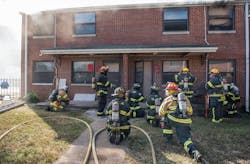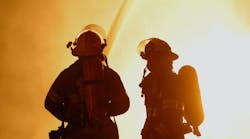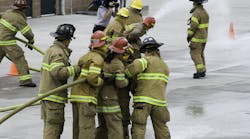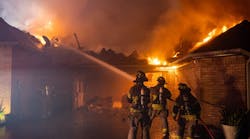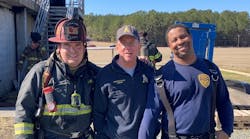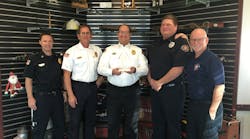I was watching TV the other day, and a comedian pointed out that the newest generation of kids never have to “wonder” about anything. The Internet changed all that. When I was a kid, I would find myself saying “I wonder” a lot: “I wonder how far the moon is from Earth?” or “I wonder what the world record speed is for a car?” But we don’t have to wonder any longer. With a device in your pocket, you now have infinite knowledge about infinite subject matter in a matter of seconds.
There are several obvious implications of the Internet and technological advances to the fire service. Electronic records-keeping, email and computer-aided dispatch (CAD) are only a few things that have improved our industry; there are so many more. And certainly fire service training has been affected with Internet-based training portals, training records-keeping and self-made YouTube-based training videos. But is there a down side to all this technology and information being only a click away? There can be.
Consistency is key
We here in the Phoenix-Metro valley enjoy what may be one of the most comprehensive automatic-aid agreements in the world. The entire valley (over 9,000 miles) is, for the most part, dispatched by one of two dispatch centers without regard for geographic or political boundaries. Because of this progressive automatic-aid agreement, you can easily have a relatively small “bread-and-butter” house fire with three or four agencies working together. As such, the Phoenix Regional Operations Consistency Committee (Phoenix-ROCC) was formed to try to improve consistency among all valley dispatch partners. The ROCC produced what we call Volume Two, which is a set of standard operating procedures (SOPs) for tactics, strategy and equipment that is followed valley-wide by over 30 fire departments.
Even if your department and region do not enjoy such a comprehensive automatic-aid agreement, I have never found a fire department that does not have either SOPs or SOGs (standard operating guidelines) to improve consistency among companies. Consistency is a concept the fire service learned from the military years ago, and it has served us well.
As I discussed previously, younger generations don’t have to “wonder” about anything, and this applies to the new-generation firefighter as well. Chances are, if there is a fire department tool or fireground tactic about which they want to learn, it is only a click away. This is when typical firefighter type-A enthusiasm can get the better of us. Having the ability to pull up so many training videos over such a broad spectrum of topics lends go-getter firefighters to want to train and try new things. But the collateral damage of this typical training attitude may be inconsistency among companies on the fireground.
Now, in the interest of being completely honest, I may have been one of the top violators of “consistency attack” when I was on my previous engine company. One of my favorite firefighter mantras that I learned early on in my career was “better to beg for forgiveness than ask for permission.” I absolutely hated bureaucratic slow down and snail-like speed when implementing projects and training, I abhorred committees and absolutely despised words like “process.” I would see a great tactic or cool tool on the Internet, get my entire crew excited about it and then want to train on it—NOW.
Knowing firefighters as I do, I know I am not the only one who suffers from bureaucratic fatigue. One of my favorite ads was a cell phone carrier commercial in which a hypothetical scenario was played out as if firefighters ran Congress. The chief at the podium holds up a thick report and says, “All this says is that we need clean air. What do you all think?” and everyone votes yes with their phones. Next the chief says, “This is a lot of paper to tell us we need clean water. What do you all think?” and once again, all the firefighters vote with their phones. “Easiest job I ever had” says the chief, and everyone chuckles. Firefighters are used to being alpha-operators who enjoy immediate results for their efforts and are more than willing to cut through the B.S. See a fire, put out the fire. Car rolled over with someone inside? Cut the car open.
Enter the Internet and a truly global training video cache to choose from and couple it with enthusiastic alpha-operators who like to be at the top of their game and what can be the end result? An attack on consistency in fireground operations.
Let me set the stage for what I am talking about: There is an aggressive crew full of alpha-operating young go-getters. They train every day and like being known as the crew that can get it done. As such, they like knowing the latest and greatest, so they can be at the top of their game. One day, a crew member watching a training video online sees a demonstration of a smoke curtain and really digs it. He shows it to the crews and they all want to try it as well. They contact a vendor off the Internet and convince a sales rep to send the station one to “try it out” and it shows up a week later. They all train with it, watch video after video, and discuss the tactics and strategy of its use at length with the crews at the station. Then it happens, they catch a job and are dispatched to a house fire.
Eager to try out their new toy, they arrive on scene and deploy their smoke curtain and get to work. The next-in company comes in and finds a curious “tarp” draped across the front door and promptly rips it down. The first-in company gets mad, stops what they’re doing and returns to the front door to put it back up. The third-in crew reports to command that there is a “curtain” across the door and promptly removes it again. The incident commander then wonders what the heck that report even meant. Sound like a Three Stooges routine? Well, if a department had not comprehensively trained on door control and smoke curtains, this scenario could easily happen.
Consistency (be it national, regional or departmental) is our friend. Consistency allows us to know (not just think or believe) what other companies are doing on a scene. It aids us in timely achieving tactical benchmarks and when the feces does hit the fan, it allows us to use muscle memory and our brains to fall back on our training to get us out of a jam. Consistency, predictability and accountability allow us to dissect the worst scene into manageable chunks that everyone gets a piece of. It was the reason FEMA created the National Incident Management System (NIMS)—to bring consistency to large-scale incidents with multiple agencies involved.
What’s next?
So how do we walk this fine line? How do we still encourage enthusiastic fire crews to seek out new ways of doing things and use the Internet as a training resource but still keep consistency within or organizations and regions? A good start is to encourage training committees through regions and organizations with participation from crews interested in innovation. But crews need to be allowed to try out new and exciting tactics, strategy and tools without being bogged down in so much bureaucracy that it takes two years to approve a new pair of vice grips for the tool box. One possible way to do this is to have certain crews designated to try out new techniques or tools with open communication throughout the department and region with the full knowledge of command staff that this is a trial period. After such trial periods, quick evaluations and a method of rapid implementation needs to be addressed.
In the meantime, we need to address the “cowboys” and “lone wolves” out there and make sure they understand the importance of consistency in high-stress fireground operations. I didn’t quite get the importance of this concept until I began to prep for my upcoming battalion chief’s test and had command of a few fires in which inconsistency in verbiage, tactics and strategy were a hindrance to operations. I have been on both sides of this issue. I have been the frustrated crew just wanting to “get it done” and skip the bureaucratic training committee process, and I have been the frustrated incident commander wondering what the heck a crew was talking about or doing. I can see both sides. One thing is for certain, the Internet and a truly global cache of fire department training and experience is going to continue to impact our jobs and industry. So let’s try our best to make sure it is done right.
